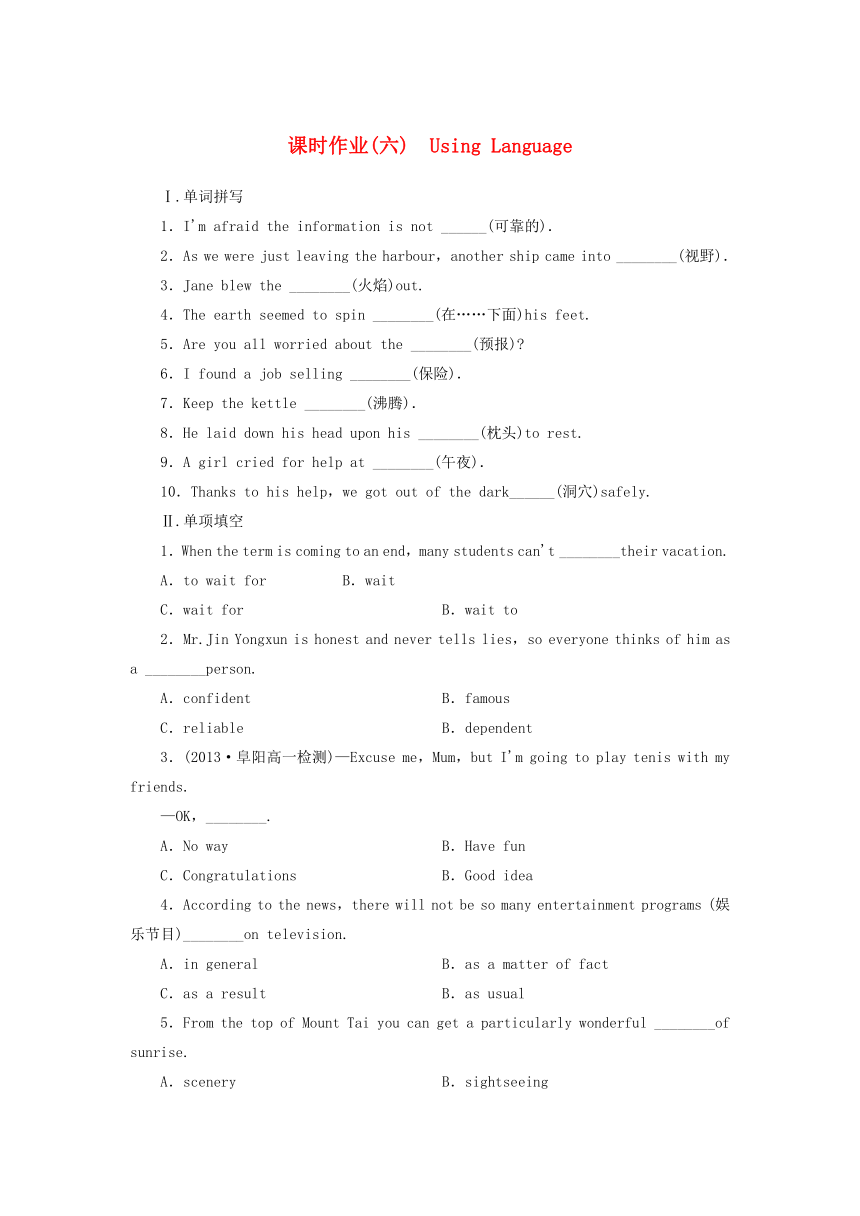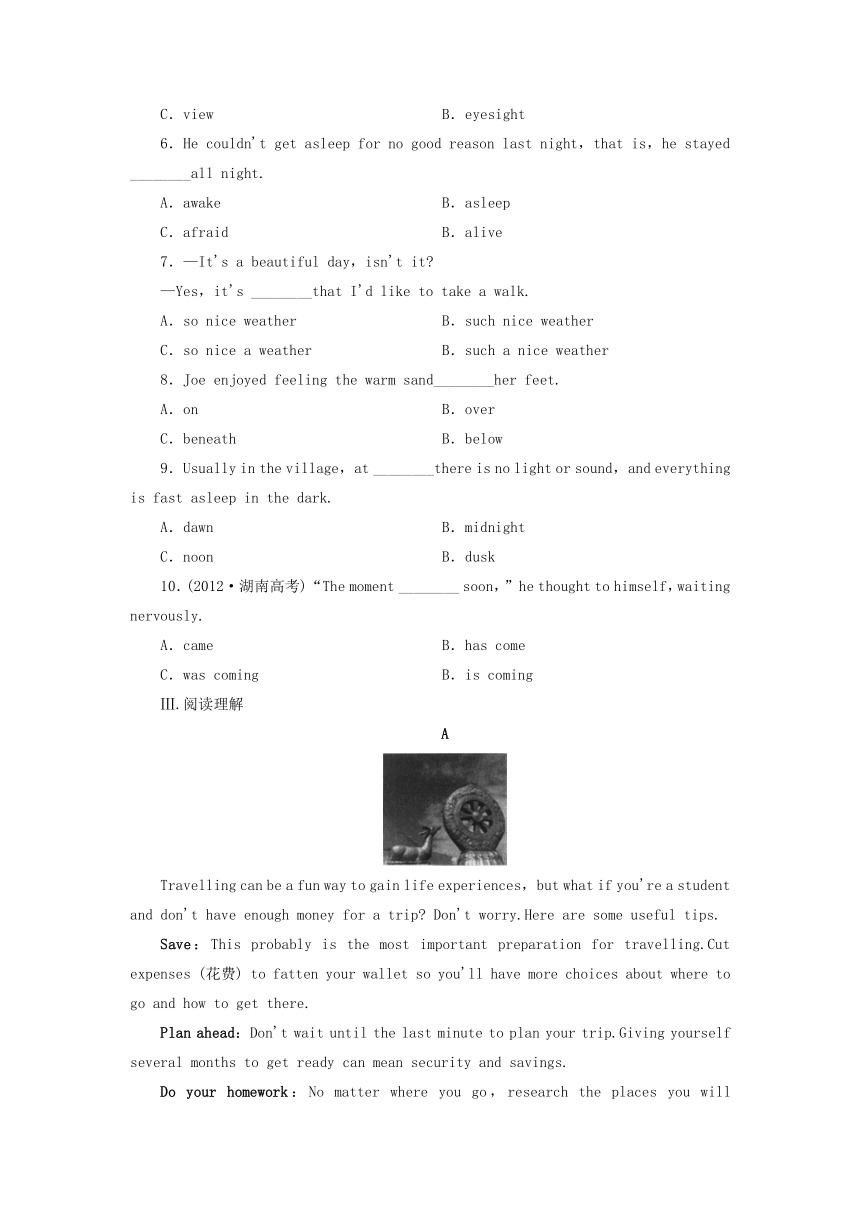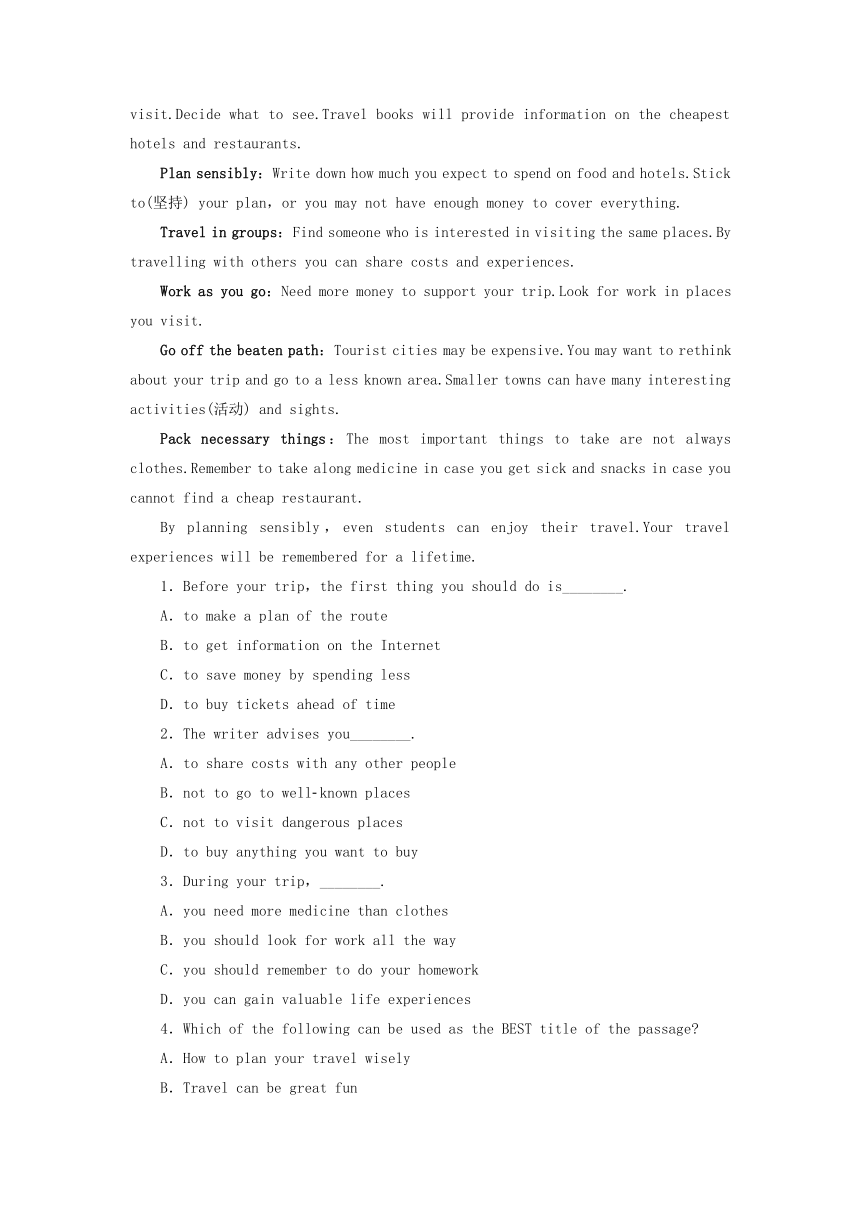2014-2015学年高中英语 Unit 3 Travel journal Using Language课时作业 人教新课标必修1
文档属性
| 名称 | 2014-2015学年高中英语 Unit 3 Travel journal Using Language课时作业 人教新课标必修1 |

|
|
| 格式 | zip | ||
| 文件大小 | 650.7KB | ||
| 资源类型 | 教案 | ||
| 版本资源 | 人教版(新课程标准) | ||
| 科目 | 英语 | ||
| 更新时间 | 2014-11-22 09:36:18 | ||
图片预览



文档简介
课时作业(六) Using Language
Ⅰ.单词拼写
1.I'm afraid the information is not ______(可靠的).
2.As we were just leaving the harbour,another ship came into ________(视野).
3.Jane blew the ________(火焰)out.
4.The earth seemed to spin ________(在……下面)his feet.
5.Are you all worried about the ________(预报)?
6.I found a job selling ________(保险).
7.Keep the kettle ________(沸腾).
8.He laid down his head upon his ________(枕头)to rest.
9.A girl cried for help at ________(午夜).
10.Thanks to his help,we got out of the dark______(洞穴)safely.
Ⅱ.单项填空
1.When the term is coming to an end,many students can't ________their vacation.
A.to wait for B.wait
C.wait for B.wait to
2.Mr.Jin Yongxun is honest and never tells lies,so everyone thinks of him as a ________person.
A.confident B.famous
C.reliable B.dependent
3.(2013·阜阳高一检测)—Excuse me,Mum,but I'm going to play tenis with my friends.
—OK,________.
A.No way B.Have fun
C.Congratulations B.Good idea
4.According to the news,there will not be so many entertainment programs (娱乐节目)________on television.
A.in general B.as a matter of fact
C.as a result B.as usual
5.From the top of Mount Tai you can get a particularly wonderful ________of sunrise.
A.scenery B.sightseeing
C.view B.eyesight
6.He couldn't get asleep for no good reason last night,that is,he stayed ________all night.
A.awake B.asleep
C.afraid B.alive
7.—It's a beautiful day,isn't it?
—Yes,it's ________that I'd like to take a walk.
A.so nice weather B.such nice weather
C.so nice a weather B.such a nice weather
8.Joe enjoyed feeling the warm sand________her feet.
A.on B.over
C.beneath B.below
9.Usually in the village,at ________there is no light or sound,and everything is fast asleep in the dark.
A.dawn B.midnight
C.noon B.dusk
10.(2012·湖南高考)“The moment ________ soon,”he thought to himself,waiting nervously.
A.came B.has come
C.was coming B.is coming
Ⅲ.阅读理解
A
Travelling can be a fun way to gain life experiences,but what if you're a student and don't have enough money for a trip? Don't worry.Here are some useful tips.
Save:This probably is the most important preparation for travelling.Cut expenses (花费) to fatten your wallet so you'll have more choices about where to go and how to get there.
Plan ahead:Don't wait until the last minute to plan your trip.Giving yourself several months to get ready can mean security and savings.
Do your homework:No matter where you go,research the places you will visit.Decide what to see.Travel books will provide information on the cheapest hotels and restaurants.
Plan sensibly:Write down how much you expect to spend on food and hotels.Stick to(坚持) your plan,or you may not have enough money to cover everything.
Travel in groups:Find someone who is interested in visiting the same places.By travelling with others you can share costs and experiences.
Work as you go:Need more money to support your trip.Look for work in places you visit.
Go off the beaten path:Tourist cities may be expensive.You may want to rethink about your trip and go to a less known area.Smaller towns can have many interesting activities(活动) and sights.
Pack necessary things:The most important things to take are not always clothes.Remember to take along medicine in case you get sick and snacks in case you cannot find a cheap restaurant.
By planning sensibly,even students can enjoy their travel.Your travel experiences will be remembered for a lifetime.
1.Before your trip,the first thing you should do is________.
A.to make a plan of the route
B.to get information on the Internet
C.to save money by spending less
D.to buy tickets ahead of time
2.The writer advises you________.
A.to share costs with any other people
B.not to go to well-known places
C.not to visit dangerous places
D.to buy anything you want to buy
3.During your trip,________.
A.you need more medicine than clothes
B.you should look for work all the way
C.you should remember to do your homework
D.you can gain valuable life experiences
4.Which of the following can be used as the BEST title of the passage?
A.How to plan your travel wisely
B.Travel can be great fun
C.Different kinds of travel
D.How to save money
5.According to the passage,even as a student,one can________.
A.enjoy travel at any time
B.never travel as one wishes
C.also enjoy a wonderful travel if he plans well
D.go everywhere as he wishes
B
People who like travelling have their reasons.They believe that travelling can help them expand their field of view,especially in the geographical and historical sense.They also think that touring will give them more chances to enjoy different kinds of food and experience new things that would never be brought by other activities.But those who dislike travelling also have some reasons.
Travelling,in my opinion,does more good than harm.Most importantly,it broadens (使扩大) our mind.We can get in touch with other civilizations(文明),cultures,customs and ideas.
Through history,most people travelled because of necessity (必要性)—not for pleasure.People travelled just in order to remain alive.They searched for food to eat or places to live in.They sometimes ran away from enemies.This is not to say that no one ever travelled just for the fun of it.In ancient times,for example,rich Romans travelled all the way to Greece to take part in the Olympic Games,and festivals.Of course,some people decided to travel just out of curiosity(好奇心).They wanted to find out what it looked like beyond the horizon(地平线).Also business travel has been going on for centuries.Traders could not only make money but also learn to speak several languages and be introduced to different cultures.
So,travelling does enrich our mind and draw new ideas to us.There is no doubt that we can get much from it.
6.The underlined word “expand” in Paragraph 1 can be replaced by“________”.
A.widen B.protect
C.lose B.decide
7.According to the passage,in the past most people travelled________.
A.for fun B.for knowledge
C.to get experiences B.to make a living
8.How many reasons for travelling are mentioned in Paragraph 3?
A.Three. B.Four.
C.Five. B.Six.
9.In the writer's opinion,travelling can be ________.
A.expensive B.funny
C.helpful B.tiring
10.What's the main idea of this passage?
A.Different kinds of travelling.
B.Travelling enriches our mind.
C.Ways to enjoy yourself while travelling.
D.The advantages and disadvantages of travelling.
Ⅳ.翻译句子
1.他照常迟到。(as usual)
________________________________________________________________________
2.我们迫不及待地看篮球赛。(can hardly wait)
________________________________________________________________________
3.浓烟密布,他们连街对面的人都看不到。(so...that)
________________________________________________________________________
4.山谷突然出现在眼前。(view)
________________________________________________________________________
5.这样的工作我们可以放心地让孩子们去做。(rely on)
________________________________________________________________________
课时作业(六)
Ⅰ.1.reliable 2.view 3.flame 4.beneath
5.forecast 6.insurance 7.boiling 8.pillow 9.midnight 10.cave
Ⅱ.1.C 句意:当学期就要结束时,很多学生迫不及待地要休假。can't wait for...迫不及待地做……,为固定表达。
2.C 句意:金永勋先生诚实并且从不撒谎,因此每个人都把他看作是一个可信赖的人。reliable可靠的,可信赖的,符合句意。confident自信的;famous著名的;dependent依赖的,依靠的。故选C。
3.B 问句是征求意见想去打网球,答语是OK表示同意,当然应该是have fun了,意为“玩得愉快”。
4.D 句意:根据新闻,在电视上将不会像往常那样有那么多的娱乐节目了。as usual像往常,符合句意。in general总体来说;as a matter of fact事实上;as a result因此。
5.C 句意:你可以从泰山顶上看到特别美丽的日出风景。view指在远处或高处以人的角度看到的景色;scenery指一个地区全部的自然风景。
6.A 句意:昨晚他毫无理由地睡不着觉。stay awake醒着。
7.B 考查so...that...与such...that...的用法。weather为不可数名词,首先排除C、D。nice为形容词修饰weather,故应用such。
8.C 句意:乔很喜欢脚下踩着温暖沙子的感觉。beneath“在……下面”,两者接触,符合题意。on“在……上面”;over“在……上方”;below“在……的下方”,一般不直接接触。
9.B 句意:通常在这个村庄,午夜时分没有灯光,没有声音,一切都在黑暗中熟睡。at midnight在午夜。
10.D 根据soon可知为将来的事情,且是直接引语,应为现在进行时态表将来,所以选D。
Ⅲ.1.C 细节理解题。根据第1条“Save:This probably is the most important preparation for travelling.”可知,节约也许是旅行最重要的准备,即首先考虑的是节约。
2.B 细节理解题。根据第7条中“旅游城市花费要多”可知,作者建议去不很著名的地方,也就是不要去著名的地方。
3.D 细节理解题。根据文章的末句“Your travel experiences will be remembered for a lifetime.”可知,旅行的经历终生难忘,换言之,人们会在旅行中获得有价值的生活经历。
4.A 主旨大意题。根据文章提到的这几点看,文章主要讲述了如何明智地安排旅行。
5.C 细节理解题。通读全文,结合文章的最后一段可知,如果计划得好,学生也可以拥有终生难忘的旅行。
6.A 词义猜测题。根据第二段出现的broadens(使扩大)及最后一段的enrich,可以推测这里的expand一词表示“扩大,拓宽”之意,widen一词与之意思最接近。
7.D 细节理解题。根据第三段第二句可知在古代人们外出多是为了生计奔波。
8.B 细节理解题。第三段中作者提到了四种旅游的原因或动机,分别是:necessity,fun,curiosity和trade。
9.C 推理判断题。作者主要讲了旅游带来的种种好处,由第二段第二句及最后一段都能看出他对旅游持积极肯定的态度,认为旅游很有益。
10.B 主旨大意题。作者在文中谈了自己对旅游的看法,他认为旅游可以拓宽人们的视野。
Ⅳ.1.He arrived late as usual. 2.We can hardly wait to watch the basketball match! 3.There was so much smoke that they couldn't see anybody across the street. 4.The valley burst into view. 5.We can rely on our children to do such work.
Ⅰ.单词拼写
1.I'm afraid the information is not ______(可靠的).
2.As we were just leaving the harbour,another ship came into ________(视野).
3.Jane blew the ________(火焰)out.
4.The earth seemed to spin ________(在……下面)his feet.
5.Are you all worried about the ________(预报)?
6.I found a job selling ________(保险).
7.Keep the kettle ________(沸腾).
8.He laid down his head upon his ________(枕头)to rest.
9.A girl cried for help at ________(午夜).
10.Thanks to his help,we got out of the dark______(洞穴)safely.
Ⅱ.单项填空
1.When the term is coming to an end,many students can't ________their vacation.
A.to wait for B.wait
C.wait for B.wait to
2.Mr.Jin Yongxun is honest and never tells lies,so everyone thinks of him as a ________person.
A.confident B.famous
C.reliable B.dependent
3.(2013·阜阳高一检测)—Excuse me,Mum,but I'm going to play tenis with my friends.
—OK,________.
A.No way B.Have fun
C.Congratulations B.Good idea
4.According to the news,there will not be so many entertainment programs (娱乐节目)________on television.
A.in general B.as a matter of fact
C.as a result B.as usual
5.From the top of Mount Tai you can get a particularly wonderful ________of sunrise.
A.scenery B.sightseeing
C.view B.eyesight
6.He couldn't get asleep for no good reason last night,that is,he stayed ________all night.
A.awake B.asleep
C.afraid B.alive
7.—It's a beautiful day,isn't it?
—Yes,it's ________that I'd like to take a walk.
A.so nice weather B.such nice weather
C.so nice a weather B.such a nice weather
8.Joe enjoyed feeling the warm sand________her feet.
A.on B.over
C.beneath B.below
9.Usually in the village,at ________there is no light or sound,and everything is fast asleep in the dark.
A.dawn B.midnight
C.noon B.dusk
10.(2012·湖南高考)“The moment ________ soon,”he thought to himself,waiting nervously.
A.came B.has come
C.was coming B.is coming
Ⅲ.阅读理解
A
Travelling can be a fun way to gain life experiences,but what if you're a student and don't have enough money for a trip? Don't worry.Here are some useful tips.
Save:This probably is the most important preparation for travelling.Cut expenses (花费) to fatten your wallet so you'll have more choices about where to go and how to get there.
Plan ahead:Don't wait until the last minute to plan your trip.Giving yourself several months to get ready can mean security and savings.
Do your homework:No matter where you go,research the places you will visit.Decide what to see.Travel books will provide information on the cheapest hotels and restaurants.
Plan sensibly:Write down how much you expect to spend on food and hotels.Stick to(坚持) your plan,or you may not have enough money to cover everything.
Travel in groups:Find someone who is interested in visiting the same places.By travelling with others you can share costs and experiences.
Work as you go:Need more money to support your trip.Look for work in places you visit.
Go off the beaten path:Tourist cities may be expensive.You may want to rethink about your trip and go to a less known area.Smaller towns can have many interesting activities(活动) and sights.
Pack necessary things:The most important things to take are not always clothes.Remember to take along medicine in case you get sick and snacks in case you cannot find a cheap restaurant.
By planning sensibly,even students can enjoy their travel.Your travel experiences will be remembered for a lifetime.
1.Before your trip,the first thing you should do is________.
A.to make a plan of the route
B.to get information on the Internet
C.to save money by spending less
D.to buy tickets ahead of time
2.The writer advises you________.
A.to share costs with any other people
B.not to go to well-known places
C.not to visit dangerous places
D.to buy anything you want to buy
3.During your trip,________.
A.you need more medicine than clothes
B.you should look for work all the way
C.you should remember to do your homework
D.you can gain valuable life experiences
4.Which of the following can be used as the BEST title of the passage?
A.How to plan your travel wisely
B.Travel can be great fun
C.Different kinds of travel
D.How to save money
5.According to the passage,even as a student,one can________.
A.enjoy travel at any time
B.never travel as one wishes
C.also enjoy a wonderful travel if he plans well
D.go everywhere as he wishes
B
People who like travelling have their reasons.They believe that travelling can help them expand their field of view,especially in the geographical and historical sense.They also think that touring will give them more chances to enjoy different kinds of food and experience new things that would never be brought by other activities.But those who dislike travelling also have some reasons.
Travelling,in my opinion,does more good than harm.Most importantly,it broadens (使扩大) our mind.We can get in touch with other civilizations(文明),cultures,customs and ideas.
Through history,most people travelled because of necessity (必要性)—not for pleasure.People travelled just in order to remain alive.They searched for food to eat or places to live in.They sometimes ran away from enemies.This is not to say that no one ever travelled just for the fun of it.In ancient times,for example,rich Romans travelled all the way to Greece to take part in the Olympic Games,and festivals.Of course,some people decided to travel just out of curiosity(好奇心).They wanted to find out what it looked like beyond the horizon(地平线).Also business travel has been going on for centuries.Traders could not only make money but also learn to speak several languages and be introduced to different cultures.
So,travelling does enrich our mind and draw new ideas to us.There is no doubt that we can get much from it.
6.The underlined word “expand” in Paragraph 1 can be replaced by“________”.
A.widen B.protect
C.lose B.decide
7.According to the passage,in the past most people travelled________.
A.for fun B.for knowledge
C.to get experiences B.to make a living
8.How many reasons for travelling are mentioned in Paragraph 3?
A.Three. B.Four.
C.Five. B.Six.
9.In the writer's opinion,travelling can be ________.
A.expensive B.funny
C.helpful B.tiring
10.What's the main idea of this passage?
A.Different kinds of travelling.
B.Travelling enriches our mind.
C.Ways to enjoy yourself while travelling.
D.The advantages and disadvantages of travelling.
Ⅳ.翻译句子
1.他照常迟到。(as usual)
________________________________________________________________________
2.我们迫不及待地看篮球赛。(can hardly wait)
________________________________________________________________________
3.浓烟密布,他们连街对面的人都看不到。(so...that)
________________________________________________________________________
4.山谷突然出现在眼前。(view)
________________________________________________________________________
5.这样的工作我们可以放心地让孩子们去做。(rely on)
________________________________________________________________________
课时作业(六)
Ⅰ.1.reliable 2.view 3.flame 4.beneath
5.forecast 6.insurance 7.boiling 8.pillow 9.midnight 10.cave
Ⅱ.1.C 句意:当学期就要结束时,很多学生迫不及待地要休假。can't wait for...迫不及待地做……,为固定表达。
2.C 句意:金永勋先生诚实并且从不撒谎,因此每个人都把他看作是一个可信赖的人。reliable可靠的,可信赖的,符合句意。confident自信的;famous著名的;dependent依赖的,依靠的。故选C。
3.B 问句是征求意见想去打网球,答语是OK表示同意,当然应该是have fun了,意为“玩得愉快”。
4.D 句意:根据新闻,在电视上将不会像往常那样有那么多的娱乐节目了。as usual像往常,符合句意。in general总体来说;as a matter of fact事实上;as a result因此。
5.C 句意:你可以从泰山顶上看到特别美丽的日出风景。view指在远处或高处以人的角度看到的景色;scenery指一个地区全部的自然风景。
6.A 句意:昨晚他毫无理由地睡不着觉。stay awake醒着。
7.B 考查so...that...与such...that...的用法。weather为不可数名词,首先排除C、D。nice为形容词修饰weather,故应用such。
8.C 句意:乔很喜欢脚下踩着温暖沙子的感觉。beneath“在……下面”,两者接触,符合题意。on“在……上面”;over“在……上方”;below“在……的下方”,一般不直接接触。
9.B 句意:通常在这个村庄,午夜时分没有灯光,没有声音,一切都在黑暗中熟睡。at midnight在午夜。
10.D 根据soon可知为将来的事情,且是直接引语,应为现在进行时态表将来,所以选D。
Ⅲ.1.C 细节理解题。根据第1条“Save:This probably is the most important preparation for travelling.”可知,节约也许是旅行最重要的准备,即首先考虑的是节约。
2.B 细节理解题。根据第7条中“旅游城市花费要多”可知,作者建议去不很著名的地方,也就是不要去著名的地方。
3.D 细节理解题。根据文章的末句“Your travel experiences will be remembered for a lifetime.”可知,旅行的经历终生难忘,换言之,人们会在旅行中获得有价值的生活经历。
4.A 主旨大意题。根据文章提到的这几点看,文章主要讲述了如何明智地安排旅行。
5.C 细节理解题。通读全文,结合文章的最后一段可知,如果计划得好,学生也可以拥有终生难忘的旅行。
6.A 词义猜测题。根据第二段出现的broadens(使扩大)及最后一段的enrich,可以推测这里的expand一词表示“扩大,拓宽”之意,widen一词与之意思最接近。
7.D 细节理解题。根据第三段第二句可知在古代人们外出多是为了生计奔波。
8.B 细节理解题。第三段中作者提到了四种旅游的原因或动机,分别是:necessity,fun,curiosity和trade。
9.C 推理判断题。作者主要讲了旅游带来的种种好处,由第二段第二句及最后一段都能看出他对旅游持积极肯定的态度,认为旅游很有益。
10.B 主旨大意题。作者在文中谈了自己对旅游的看法,他认为旅游可以拓宽人们的视野。
Ⅳ.1.He arrived late as usual. 2.We can hardly wait to watch the basketball match! 3.There was so much smoke that they couldn't see anybody across the street. 4.The valley burst into view. 5.We can rely on our children to do such work.
